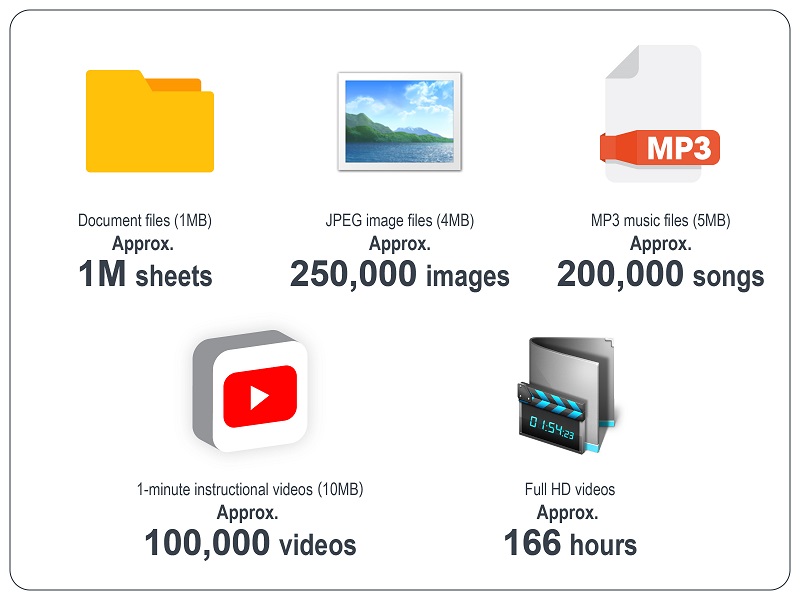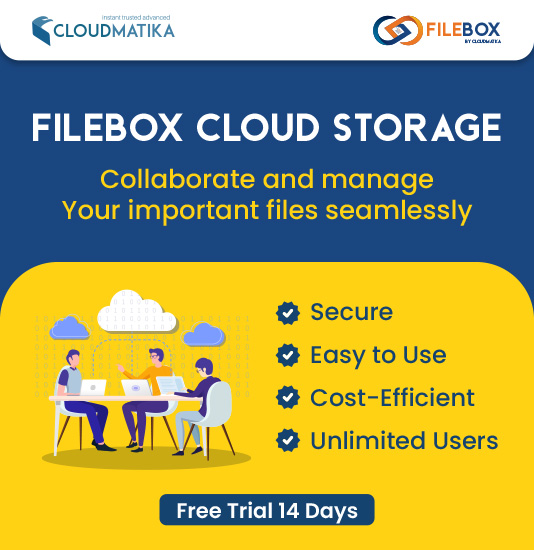Cloudmatika is one of the credible cloud storage service providers in Indonesia with its flagship product, Cloudmatika Filebox. This article will discuss data storage capacity in detail which is one of the superior features of Cloudmatika Filebox.
There are many factors to consider when choosing a cloud service. These choices can become even more complicated by the growing speed of digital transformation (DX) and the restructuring of management and business processes through digital technology. The data being transferred and shared between companies will only increase over time.
One popular choice is Cloudmatika Filebox for the peace of mind it brings with a starting storage capacity of 1TB, an easy-to-use interface, and the option to upgrade as necessary. However, since it can be difficult to grasp how much 1TB is true, let's look at what capacity really means.
GB? TB? What does it actually mean?
Laptop capacity
It is difficult to install large hard disk drives (HDD) in laptops compared to desktop computers. The most common sizes for HDDs are 128GB (gigabyte), 256GB, 516GB, and 1TB (terabyte). When measuring data, the basic unit is one byte; technically speaking, the next unit is 1024 times larger. However, to more easily remember, it is safe to generalize that it is 1000 times larger.
- 1,000B(byte)=1KB(kilobyte)
- 1,000KB=1MB(megabyte)
- 1,000MB=1GB(gigabyte)
- 1,000GB=1TB(terabyte)
Recently, solid-state drives (SSD) have become popular, which are faster to read and write than HDDs and are more shock-resistant due to a lack of moving parts. However, they can be more expensive than HDDs and have a smaller capacity, with most SSDs built into notebook computers having 240-500GB of storage.
Capacity comparison based on a media type
Even though you may be aware that 1TB of capacity is quite large, it may be difficult to visualize it with just the number of bytes. The following chart provides more concrete examples by converting that capacity into familiar media storage capacity.
Now that we hopefully have a better idea of how big a 1TB drive is, let's look at some different options.

Unlimited capacity is becoming the new norm.
It is important to remember that the current trend, especially among the larger industry players, is to offer various pricing systems, including unlimited services. However, in most cases, the cost is set on a per-user basis.
1. Most large capacity plans are underused
While some major cloud services offer large capacity plans with up to 2TB per user, it is highly unlikely that a single user in a company would efficiently use 2TB of space. (Who needs to store two million Excel and Word files?)
At first glance, it might appear that bigger is better. However, many companies find that they do not need that much capacity once they start using the service. Another issue is if a company tries to save money by sharing one account between different users, there are security concerns, such as data deletion with no record of who did it.
In addition, one of the most attractive features of online storage is the ability to centrally manage access and editing privileges for each folder and user, which is lost with a shared account. As a result, important data may end up only on the manager's personal computer. For these reasons, sharing accounts to cut costs is not recommended as it not only makes the high-capacity plan a waste of money but also increases security vulnerabilities.
2. Unlimited users: efficient and secure
On the other hand, with an unlimited number of users, such as with Cloudmatika FIlebox, it is possible to divide folders among all employees and business partners at no extra charge and share the capacity without wasting space.
With the basic 1TB plan, which is sufficient for small and medium-sized business users, you can create an account for each user. It is also easy to organize and delete user accounts that are no longer needed, providing peace of mind regarding management and security.
You can learn more about Cloudmatika FileBox benefits and security details in this article.
Considering the different issues and options available, it is obvious that it is important to choose the cloud storage service that best suits your business, the number of users, and the volume and type of data to be handled.
A growing need for data
One reason for the increase in cloud storage service capacities, including Cloudmatika Filebox file’s initial 1TB capacity, is the growing volume of data that companies generate and exchange because of DX and in response to the COVID-19 pandemic.
According to a survey by the Japanese Ministry of Internal Affairs and Communications, domestic fixed-line broadband Internet subscribers' total download traffic in May 2020 was approximately 19.0 Tbps* (estimated), up 57.4% from the same month the previous year.
*Tbps (terabits per second): a unit that indicates how many trillions of bytes or bits (1 terabits = 1,000 GB) of data can be transferred per second. For example, a download speed of 2.5Tbps is capable of continuously downloading 7 Blu-ray movies per second (see: Gizmodo).
As businesses embrace data, the need for storage and sharing is expanding.
Until recently, email and File Transfer Protocol (FTP) has been the mainstream data exchange method between companies. However, there were limitations on the amount of data that could be transferred, and it was often necessary to compress, process, or split the data before sending it. The data capacity for email attachments is usually 10 to 100MB, making it almost impossible to send high-quality image files or videos.
If a better solution cannot be easily implemented, time will be lost, potentially creating a significant delay. In addition to DX, as remote work further increases in response to the COVID-19 pandemic, companies will ultimately lose their competitive advantage if they cannot successfully solve this issue of how to store and share data.
Examples of large data use for business
The following are some specific examples of how businesses rely on data:
- Delivering design and document data in manufacturing and other industries.
- Sharing information across language and OS differences between overseas engineers, creators, and marketers.
- Uploading CAD data, drawings, and site photos for collaborative projects in the building and construction industry.
- Exchanging large volumes of research data analyzed by laboratories.
- Sending design data to printing and advertising companies.
- Downloading instructional videos on work procedures at an overseas location.
The above can be completed quickly, securely, and easily with the right cloud storage service.
A one-year, unlimited-user Cloudmatika Filebox contract with 1 TB storage is available for Rp. 1.580.000/month. However, there is a significant discount for longer-term contracts.
Regarding capacity, there is usually no need to worry if only exchanging and storing Word or Excel files, but do remember that some types of companies, such as architecture, design, and video production, use specialized tools for their work, often creating large amounts of data that need to be processed. However, a 1TB capacity can easily handle a large traffic volume if each employee needs to use more storage space than usual.
Unlimited users + flexible capacity options for any situation
With Cloudmatika Filebox, the number of users is unlimited, so whether you have 100 or 1,000 users, the cost is fixed. Data capacity can also be increased with no limit, according to the growth of your company and the amount of data handled there is no need for costly employee training.
To experience it for yourself, click here to learn about our FREE 14 DAYS TRIAL!

 English
English Indonesia
Indonesia










